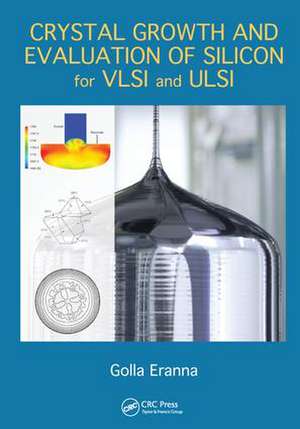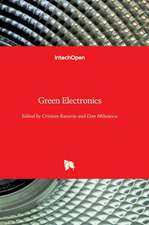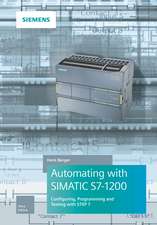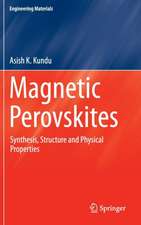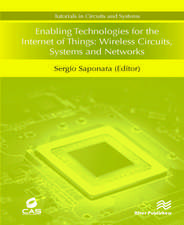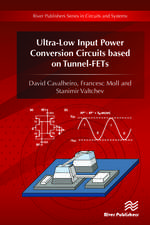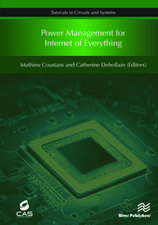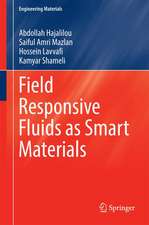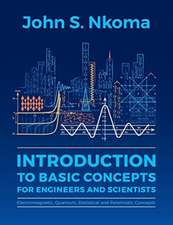Crystal Growth and Evaluation of Silicon for VLSI and ULSI
Autor Golla Erannaen Limba Engleză Paperback – 19 oct 2016
Crystal Growth and Evaluation of Silicon for VLSI and ULSI is one of the first books to cover the systematic growth of silicon single crystals and the complete evaluation of silicon, from sand to useful wafers for device fabrication. Written for engineers and researchers working in semiconductor fabrication industries, this practical text:
- Describes different techniques used to grow silicon single crystals
- Explains how grown single-crystal ingots become a complete silicon wafer for integrated-circuit fabrication
- Reviews different methods to evaluate silicon wafers to determine suitability for device applications
- Analyzes silicon wafers in terms of resistivity and impurity concentration mapping
- Examines the effect of intentional and unintentional impurities
- Explores the defects found in regular silicon-crystal lattice
- Discusses silicon wafer preparation for VLSI and ULSI processing
| Toate formatele și edițiile | Preț | Express |
|---|---|---|
| Paperback (1) | 461.03 lei 6-8 săpt. | |
| CRC Press – 19 oct 2016 | 461.03 lei 6-8 săpt. | |
| Hardback (1) | 1289.45 lei 6-8 săpt. | |
| CRC Press – 8 dec 2014 | 1289.45 lei 6-8 săpt. |
Preț: 461.03 lei
Preț vechi: 542.39 lei
-15% Nou
Puncte Express: 692
Preț estimativ în valută:
88.22€ • 94.34$ • 73.55£
88.22€ • 94.34$ • 73.55£
Carte tipărită la comandă
Livrare economică 17 aprilie-01 mai
Preluare comenzi: 021 569.72.76
Specificații
ISBN-13: 9781138034198
ISBN-10: 1138034193
Pagini: 430
Ilustrații: 264
Dimensiuni: 178 x 254 x 22 mm
Greutate: 0.45 kg
Ediția:1
Editura: CRC Press
Colecția CRC Press
ISBN-10: 1138034193
Pagini: 430
Ilustrații: 264
Dimensiuni: 178 x 254 x 22 mm
Greutate: 0.45 kg
Ediția:1
Editura: CRC Press
Colecția CRC Press
Public țintă
Professional Practice & DevelopmentCuprins
Introduction. Silicon: The Key Material for Integrated Circuit Fabrication Technology. Importance of Single Crystals for Integrated Circuit Fabrication. Different Techniques for Growing Single-Crystal Silicon. From Silicon Ingots to Silicon Wafers. Evaluation of Silicon Wafers. Resistivity and Impurity Concentration Mapping of Silicon Wafers. Impurities in Silicon Wafers. Defects in Silicon Wafers. Silicon Wafer Preparation for VLSI and ULSI Processing. Packing of Silicon Wafers.
Notă biografică
Golla Eranna obtained his master’s degree from Sri Venkateswara University, Tirupati, India, with a top rank in the field of semiconductor physics. After that, he joined and received his Ph.D from the Indian Institute of Technology (IIT) Madras. Later, he moved to the IIT Kharagpur Microelectronics Centre. Dr. Eranna joined CEERI, Pilani, India, as a scientist and is currently a senior principal scientist. He became a professor under the Academy of Scientific and Innovative Research (CSIR, New Delhi), and regularly lectures on VLSI processing technology. He also maintains a full-fledged semiconductor device fabrication laboratory.
Descriere
This is one of the first books to cover the systematic growth of silicon single crystals and the complete evaluation of silicon wafers, from sand to useful wafers for device fabrication. Written for engineers and researchers in semiconductor fabrication industries, this essential reference describes techniques used to grow silicon single crystals, reviews methods to evaluate silicon wafers to determine suitability, examines the effect of intentional and unintentional impurities, explores defects found in regular silicon-crystal lattice, and discusses silicon wafer preparation for VLSI and ULSI processing.
